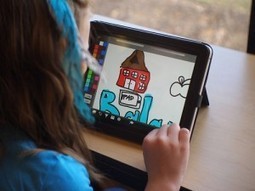"When St. Louis fifth-grade teacher Jenny Kavanaugh teaches history, she uses her laptop to look at a map, or to give kids a virtual
our of the historical landmarks they’re studying. “Students can interact with history in very cool ways online,” she said."
But when it’s time for math, she puts the computer away. Even though Kavanaugh thinks technology is a great tool to enhance and deepen certain lessons, for drill and practice of key concepts in class, she finds one-on-one practice to be much more effective than its technological equivalent – digital practice games.



 Your new post is loading...
Your new post is loading...








This blog post discusses the use of technology and games in the classroom. While teacher Jenny Kavanaugh uses games and technology for teaching history, she criticizes the drill like nature of math games and the post sees that developments need to be made in educational games to make them more useful and engaging. It seems that history is at the forefront though, as online content is able to give a more direct experience of past, place, and events.
Kids like many people learn in a variety of ways so whether you teach the "old fashion" way or through technology I think you must be aware of this. Digital games are just one way to achieve this but I think you have to fully immerse yourself and your students in the technology to be able to fully grab the good intention of it. Trial and error still work.